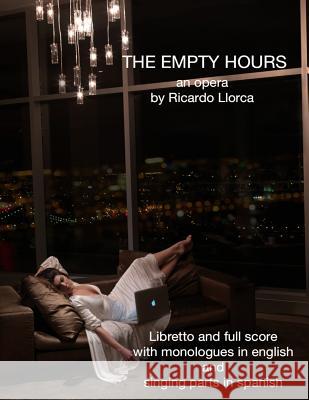The Empty Hours: (Opera/Monodrama for Soprano/Actress, Piano, Chorus, and String Orchestra) » książka
The Empty Hours: (Opera/Monodrama for Soprano/Actress, Piano, Chorus, and String Orchestra)
ISBN-13: 9781493629480 / Angielski / Miękka / 2013 / 302 str.
"The Empty Hours"" - an opera/monodrama for soprano, actress, chorus, piano and strings orchestra- is a work about a lonely woman, addicted to the internet, who lives in her own fantasy world. "The Empty Hours" is an attempt to explore a psychological process, so common in our contemporary world: the loneliness and the increasing feeling of emptiness of the developed Western societies. The compositional techniques in the score have already ample abstractions symbolizing the fragmentation of society, the isolation, the loss of identity that accompanies technology and the dark side of modernity. "The Empty Hours" arose from Ricardo Llorca's growing interest in juxtaposing and combining traditional techniques with elements of contemporary music. Italian and Spanish Renaissance music and 17th Century operatic recitatives blended with a more contemporary language have served as the principal source of thematic and structural inspiration for this work. Building upon these ideas Llorca has created recognizable melodic cells and poly rhythmic combinations within a stable structure and bitonal harmonies over a traditional foundation. The score is complex, as one would expect in a contemporary opera, but not indecipherable. Similarly, the timbre possibilities of the soprano have been thoroughly exploited, in some cases supported by the orchestration and in others opposed by it, but always within the limits of conventional writing for each instrument. '"The Empty Hours" thus acquires a dual character, at once traditional and contemporary, maintaining a coherent narrative which is elaborated over a harmonic and melodic foundation that may be called non-atonal. According to Llorca: "In order to shed light on the ideas behind this opera and my motivations for composing it, it may help to mention certain factors and subjective phenomena which I believe define the work. In my opinion, there is a great deal of confusion today about the objectives of contemporary music and the elements it has at its disposal. In the absence of a single unifying tendency or a specific defining style, young composers have been forced to choose between continuing along the path of experimentation or returning to a classical framework. Some of us have felt unable to continue conforming to the aesthetic models that have dominated classical music in recent decades. Looking back is perhaps the only viable alternative: reexamining the past, working with classical (horizontal and vertical) structures and concepts, and rehabilitating traditional views of musical expressiveness. When I began writing this opera, I wanted to create a dual work in the sense that it would be a both a product of instinct and a result of formal reflections on structure and development. I have chosen to give the opera a classical formal character, with defined structure and development, as well as cadenzas. I have also made use of traditional techniques such as counterpoint, fugues, and functional-harmonic development. Above all, I have taken care to avoid the impression of randomness, ensuring that the sounds conform to a plan and follow an organization that reflects their inherent relationships and correspondences. Without this previous organization, the music would lack all expressive power and would amount to little more than haphazard forms in space. In short, I have attempted to create a solid musical structure that governs the piece from beginning to end." "The Empty Hours" was premiered at the "XII Setmana de Musica Sacra de Benidorm," and later performed at the Berlin Cathedral on September 7th 2007; at the Dag Hammarskjold Theater at the United Nations in New York City on November 17th 2008; and at Alice Tully Hall (Lincoln Center, New York City) on November 19th 2010. A CD recording of "Las Horas Vacias/The Empty Hours" has been released by Columna Musica on September 2011."
Zawartość książki może nie spełniać oczekiwań – reklamacje nie obejmują treści, która mogła nie być redakcyjnie ani merytorycznie opracowana.











